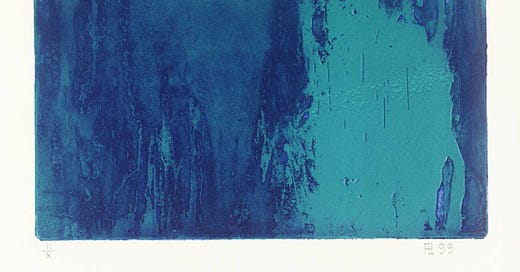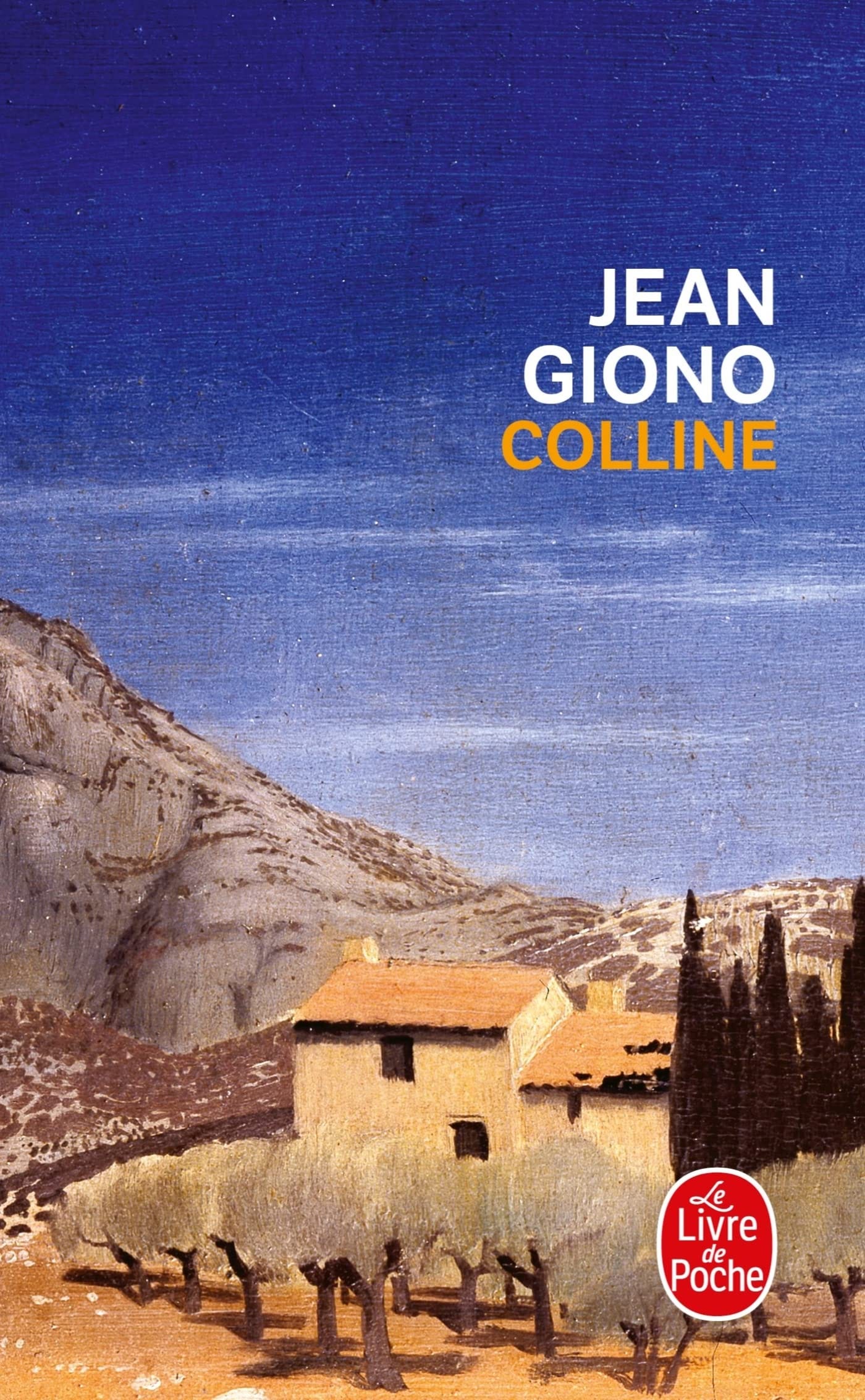Jean Giono. Melville: A Novel. Translated from the French by Paul Eprile. Introduction by Edmund White. NYRB Classics, 2017 [1941]. 108 pp.
Jean Giono. Hill. Translated from the French by Paul Eprile. Introduction by David Abram. NYRB Classics, 2016 [1929]. 115 pp.
File this letter under: “Ketchup.”
With many writers, once you’ve engaged with a large amount of their work, you begin to see a broader, overarching “project” that may contain their books. C. F. Ramuz is one: this French-Swiss author has a vision of a novel as a little easel painting, or a very very well-crafted wooden box, a devotion to miniature artisanal excellence.
Very similar is Jean Giono, who has been getting work translated into English recently by the poet Paul Eprile. And so it happened that these two short books for today’s letter were drafted from the NYRB Classics tote bag.
Giono had a long publishing career over the twentieth century. In his introduction for Melville, Edmund White tells us that his work divides into two periods: “his Pan Cycle (including the recently translated Hill), works of an almost folkloric quality that highlighted his native Provençal landscape, and his Hussard Cycle, in which he invested his extraordinary energies into fashioning unforgettable characters.”
One might think a novella of Herman Melville’s life just before beginning work on Moby-Dick would fit most squarely in Giono’s second period, but it is really a pastoral novel.
Giono had a deep relationship with Melville’s monumental novel Moby-Dick. He had collaborated in a translation of it in French in the late 1930s. Apparently this novel began as a “Preface” for that translation, but it clearly took on a life and mind of its own.
And likewise to the author Giono, the fictive Melville, when we meet him in 1849, about to take a trip to England, holds an affection for the great poet Walt Whitman:
Democracy is propelling the whole of the New World into its first explosion of lyricism. “Liberty Poem for Asia, Africa, Europe, and America” is already on Whitman’s lips:
Courage yet! my brother or my sister!
Keep on! Liberty is to be subserv’d whatever occurs….
But this is not precisely the biographical Melville, who was famously a depressed man. “He’s never been very depressed. At least, he means to say, not depressed like other people.” This Herman is much more gregarious, “expansive,” charming company, as if Giono were screening his own traits or concerns onto this situation.
Herman spends a good deal of the early pages in dialog with an imaginary angel. It’s more like a “battle” than a discussion: “You haven’t let me eat one plate of beefstake and potatoes in peace. My job as a poet — since say that I am one — my modest job as a poet. To write books I know how to write.”
This “angel” followed him back from a voyage. It calls him a sellout, Herman replies: “So, then what? I’ve written a few books. They’re stories. They’re entertaining, that’s all.” And amongst his protests and “Go to hell”s the angel (whose speech is never quoted) suggests that he needs to work on something radically different, really this is Herman’s own sense of artistic dissatisfaction.
Some time later, he’s indulging and at the same time resisting some self-pity while eating some rice. These lines are seemingly both from Herman and the narrator, and they’re seemingly addressed both to us and to the “angel.”
I am not a lost child. Do I have places to spend my nights and days? I have them up to my ears — I couldn’t possibly have more. I am not a lost child. I’m a lost man, and that’s another matter. Wake up in the middle of the night, clamber to the top of the mast and stay there, panting like a seal, watch, wait, heart racing, bang your head against the wall of darkness, wear your eyes, out, wear your heart out. What for, after all? Because you’re about to reach dry land?
These lines naturally struck your host, since Ishmael, at the end of his narration of Moby-Dick, is also an “orphan” clinging to a coffin after the wreck of the Pequod (to be picked up by the Rachel, a ship named after the ancestral mother of the Hebrew tribes). And it’s not just a literary pun, but a thought that speaks to Ishmael’s whole situation: he’s clearly from a good family, and should be puttering away in a university, but he must have been “cast out” at some point and is now working on whalers. Melville himself, from a disgraced petty-bourgeois family, could never fit in with the intolerant Pentecostal atmosphere of his own surroundings.
At any rate, I classify this text as a pastoral novel because the bulk of it is taken up with a trip to the English countryside with a remarkably clever woman named Adelina, an Irish nationalist. We follow days and nights on a Mail coach through the scenery.
Morning was brushing the land the way green willow boughs brush the water’s surface. Ripples of liquid light were spreading out across the meadows and the woods, and splashing back as gold dust against the grass stems and the branches. Because of the noise of the wheels, it wasn’t possible to talk. But from time to time, when a new range of sunlit hills emerged from the mist, the two of them looked at each other.
It’s tempting to forget we’re supposed to be in Britain and imagine instead the glorious “golden” sunshine of southern France.
A brief escape from the city, some inspiration, a manifestation for the angel — after all this Herman goes home fortified to compose Moby-Dick (and one passage arguably does some “Preface” work by explaining the origins of the narrative in the real-life combative whale Mocha Dick off the Chilean coast (as opposed to the final showdown in the Indian Ocean in the book).
They continue a correspondence, and Adelina can tell from Herman’s letters when he’s in the flow versus when he’s taking a break.
The breaks are hikes, which he now takes on his own, at full tilt across the hills, his pockets stuffed with paper and pencils, seeing nothing around him but the sea, the sea, the sea, and then, at the bottom of the valley, his house, which looms out, and toward which he quickly bends his course, so as to return and write.
This was a nice and moving narrative that would probably reward a re-read, and yet your host was hit harder by a new translation of Giono’s very first book from 1929: Colline.
The poet Paul Eprile has been doing amazing work with his recent translations of Giono. The English prose has an effortless flow, and the extra stuff and original artwork for the frontspieces are appreciated. Giono’s works have had English translations since the 30s but they had stopped until Eprile initiated this new wave with Hill as a passion project, championed by Edmund White for NYRB.
Here is a work of full-throated Provençal pastoralism. The prose is terse and riddled with space breaks: the reader feels the fundamental leisureliness of living and working on the hillside that makes life feel like one big siesta.
Sainfoin in bloom bleeds red under the olive trees. Bees dance around birches sticky with sap.
A fountain murmurs and overflows in two streams that plunge from a ledge and scatter in the wind. Gurgling under the grass, they reunite and course through a bed of rushes.
The wind hums in the plane trees.
Like in Thomas Hardy, the narration renders in a landscape full of ongoing natural processes before our attention lands on any recognizable civil human. The story focuses on four households on the hill, centrally Gondron caring for his ailing and dying father-in-law Janet, and the neighbor Alexander Jaume.
But we get vivid portraits of the other denizens and family members too, and how they cope with crisis. One day water fountain cuts off. There are strange omens. There’s a sinister presence baked into the landscape, and the novella takes on a tone of folk horror.
Janet from his bed is unrelentingly misanthropic to everyone else, seems to take glee in the community’s disquiet. Jaume comes to Janet for counsel, and Janet calls hims a “Jackass” and worse. What’s his problem?
“You’re fucked.”
“Don’t say that, Janet. It sounds like you’re glad about it.”“I am glad. There are always too many jackasses like you.”
“Why are you talking like this? Do you have a problem with somebody?”
“With all of you.”
Janet goes on to elaborate:
“I bet you’ve never given any thought to the great power?
“The great power of animals, plants, and rock.
“Earth isn’t made for you alone to keep on using the way you’ve been used to, on and on, without getting some advice from the master every once in a while. You’re like a tenant farmer — and then there’s the landlord. The landlord in his handsome, six-button jacket, his brown corduroy vets, his sheepskin coat. Do you know him? the landlord…”
The monologue goes on, and maybe it’s the maundering of a sick and angry old man. Or it’s the spontaneous testimony of a dark Gaia-based spiritualist, a god who takes the image of the old seignorial landowners of feudalism.
But you can see how Jaume has a lot to feel disturbed about:
The old ways were straightforward. There was humanity, and all around, but underneath, animals and plants. And things were going along well that way. You kill a hare, you harvest a fruit. A peach — it’s nothing but sweet juice in your mouth; a hare — it’s a heaped-up plateful of rich, dark meat. And afterward, you lick your lips, and you smoke a pipe on the front step.
It was simple, but it left a lot of things in the dark.
From now on it’s going to be necessary to live in a lit-up world, and it’s painful.
It’s painful because it’s not just humanity anymore, with everything else underneath, but there’s a giant ill will and, way down below, humanity tossed in together with the animals and plants.
As if all this weren’t bad enough, a wildland fire breaks out. The mesmeric sun-drenched countryside spell disappears and Giono via Eprile writes a legitimately rousing action sequence, as the natural evil besieges the homestead:
The women weren’t ready for this. It was far away, this fire, and now, all of a sudden, here they are, the men, tumbling down on top of them: “Hurry, cover up the windows with wet sheets, and everybody get inside.” Next they set to hacking with all their might to open a ditch in front of the houses. Arbaud is slashing away at the dry grass and at the thatch of abandoned grain with big, rage-filled strokes of his scythe, off balance, as though he were drunk or crazed.
Hill is just a really cool narrative and very much of its type, escalating into something quasi-biblical by the climax. Supposing that Janet is right about the true dwelling place of God, then we should not be hiding our crimes from the Landlord’s gaze by burying them. We’ll leave it at that!
Next week: back in L K-Town



